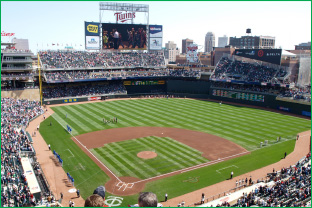Home Runs Abound: Going Green While Saving Green in Sports
 As water conservation becomes an increasing concern, many stadium and arena operators are implementing different methods to improve water stewardship. They are doing this for environmental reasons and saving money in the process.
As water conservation becomes an increasing concern, many stadium and arena operators are implementing different methods to improve water stewardship. They are doing this for environmental reasons and saving money in the process.
In some areas, local utilities are helping. Stadium Management Company, which runs Sports Authority Field at Mile High in Denver, received a rebate from Denver Water worth $60,000 or 40 percent of what it paid for a new irrigation control system. The system has moisture sensors under the stadium’s turf and more water meters around the 89-acre site to better track water use. Tracking water use in this way means the irrigation system only runs when the moisture levels require it. If it’s raining, the irrigation system senses there’s no need to run. The company also received $18,000 in rebates for other reductions in water use, such as the installation of toilets that use about 20 percent less water per flush for the stadium’s 144 luxury boxes.
Several other venues have had excellent results installing water conservation systems. The Anschutz Entertainment Group, which runs the Staples Center in Los Angeles, has replaced all 178 of its urinals with waterless urinals, saving more than 7-million gallons a year and $28,200 annually. At the StubHub Center in Carson, CA, recycled water is used to irrigate playing fields, saving about 35 Olympic swimming pools of drinking water each year. Citizens Business Bank Arena in Ontario, CA, uses reclaimed water to fill cooling towers, saving about 115,000 gallons of potable water each week.
How Water Works at Target Field
Another big environmental endeavor in sports involved Target Field, the stadium built for the Minnesota Twins, in 2009. The options for building a water conservation system were limited because the venue’s water and wastewater piping systems were already built. The Minnesota Ballpark Authority called on the help of Pentair, a global producer of sustainable water solutions, to work around this challenge. The result was a custom-designed rainwater recycling system. The ground at Target Field is made up of multiple layers. Grass filters water into a sand layer, underneath the sand is a rock layer and then the water goes into a complex drainage system where it can be thoroughly cleaned through the Pentair filtration system. The filtered and treated water is then used to clean the stadium.
The custom rainwater recycling system is good for the environment and good for baseball. Target Field saves nearly 2-million gallons of water each year with their green solution, and games are able to resume much faster after rain. Kevin Smith, Executive Director of Public Relations for the Twins, says, “You’ll go out there half an hour after a rain storm and it’s like it never happened.”
Winning Technology On and Off the Field
How is this state-of-the-art filtration system kept up and running? PeopleService contracts with Pentair to provide the service and maintenance for the system on a weekly basis. “We make sure the chemicals are at the right levels and the entire process is functioning properly through our intensive checklist,” said Shawn Wilson, the PeopleService operator on the project. “We are on-call for emergency situations, such as a water break, or any other issues that may occur,” Wilson added. What does working at Target Field mean to Shawn? “I think it is awesome that everyone of us on this team has a part to play. So, knowing that I am able to contribute to an amazing team who cares about the environment and looking for ways to better it, is a win for me!”
The rainwater recycling program, along with several other sustainability projects, has enabled Target Field to become the first professional sports facility to receive LEED (Leadership in Energy & Environmental Design) Gold Certification. Whether you’re a baseball fan or not, this ballpark is a great starting point for a study in creating a more sustainable world.


